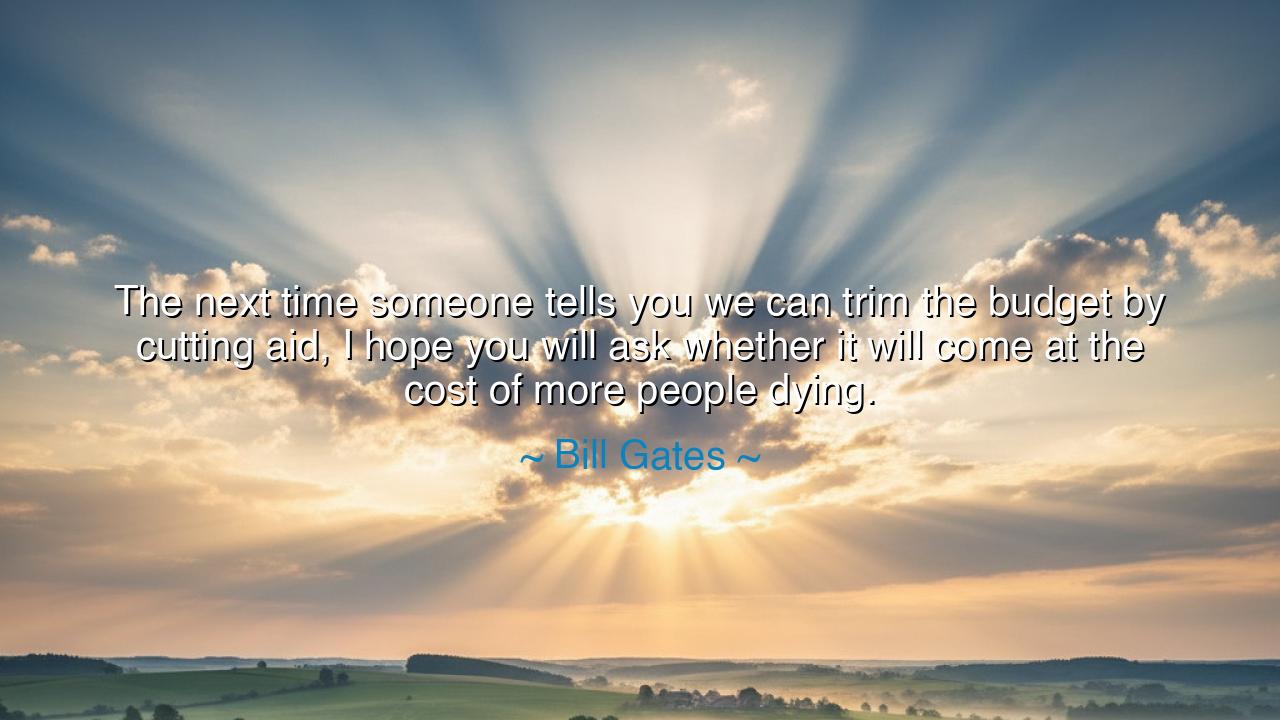
The next time someone tells you we can trim the budget by cutting
The next time someone tells you we can trim the budget by cutting aid, I hope you will ask whether it will come at the cost of more people dying.






The philanthropist and visionary Bill Gates, in his words “The next time someone tells you we can trim the budget by cutting aid, I hope you will ask whether it will come at the cost of more people dying,” speaks not as a businessman of profit, but as a guardian of compassion. His statement is both a moral challenge and a plea for conscience. It reminds us that behind every economic policy, every statistic, and every political decision, there are human lives—souls that breathe, hunger, dream, and suffer. He urges us to look beyond the numbers, to see the faces hidden behind the phrase “foreign aid,” and to remember that to withdraw help from the vulnerable is to let death gain ground where life might have prevailed.
To cut aid may seem efficient on paper, but in truth, it is to sever the lifeline of millions who depend on medicine, food, education, and clean water. Gates, whose foundation has dedicated itself to eradicating disease and lifting the poor, has seen firsthand the transformation that even small acts of generosity can achieve. A single vaccination program can save generations. A well can free a village from disease. A scholarship can change the destiny of a nation. Thus, when he speaks of the cost of “more people dying,” he is not using rhetoric—he speaks from the solemn witness of experience.
In ancient times, wise kings understood that the wealth of a nation was not measured by its gold, but by the health of its people. The Pharaohs built granaries to sustain their people through famine; the Roman emperors maintained the annona, the public grain supply, so that the poor would not starve. Even in the darkest ages, the great leaders knew: to abandon the weak is to invite the collapse of the whole. The disease of neglect spreads faster than any plague, and when compassion is cut from the human heart, civilization itself begins to die.
Consider the story of the Marshall Plan after the Second World War, when the United States, rather than retreat into isolation, sent aid to rebuild the very nations that had once been its enemies. The result was not only recovery, but a rebirth of peace and prosperity across Europe. It was proof that aid is not charity—it is wisdom, for when one nation suffers, all humanity feels the tremor. Gates, in his modern way, calls upon us to remember that same truth: that to give is to strengthen the world, and to withdraw generosity is to invite despair.
Yet today, amid the comfort of wealth and technology, we risk becoming numb. We speak of budgets, deficits, and balance sheets as if they were sacred, while human lives are treated as expendable. Gates’ words cut through this illusion. He reminds us that a budget is not a moral compass—it is a tool. And a tool that values savings over souls is an instrument of decay, not progress. True prosperity is not the hoarding of resources, but the sharing of them, for humanity’s health is a single, beating heart—if one part weakens, all are diminished.
There is also, in his plea, a call for personal responsibility. He does not speak only to governments, but to every individual who hears the argument for selfishness disguised as practicality. He asks us to question, to speak, to resist the cold logic that counts money but ignores mercy. For the measure of a just society is not how much it saves, but how much it cares. The ancients would have said: “A nation that forgets compassion has already begun to die.” Gates, in modern tongue, says the same.
Therefore, my child, remember this teaching: when you are told that aid is too expensive, that generosity is impractical, that compassion is inefficient—ask the sacred question: at what cost? Whose lives will fade so that numbers might improve? For every coin withheld from mercy, there is a heart that will stop beating before its time. Let your voice, however small, defend life over ledger, kindness over calculation.
In the end, Bill Gates’s words are not about economics—they are about the moral architecture of humanity. They remind us that progress without compassion is an illusion, and that no budget, however balanced, can justify a world where preventable suffering continues. Let us then be the stewards of both wisdom and love, and ensure that in every decision, whether of a nation or an individual, we choose the path that saves life, uplifts the weak, and honors the sacred duty of being human.






AAdministratorAdministrator
Welcome, honored guests. Please leave a comment, we will respond soon